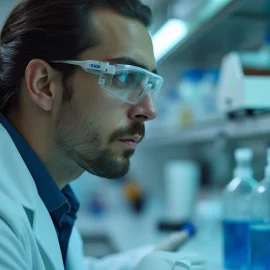
We’ve put together discussion questions for The Immortal Life of Henrietta Lacks by Rebecca Skloot that you can use with a book club or a class at school. We include sample answers, book club activities that will help you get more out of what you’ve read, and recommendations for more reading if you like this book.
Table of Contents
Book Synopsis
The Immortal Life of Henrietta Lacks tells the true story of Henrietta Lacks, a poor African American tobacco farmer who died of cervical cancer in 1951. Before her death, doctors at Johns Hopkins Hospital took samples of her cancer cells without her knowledge or consent. These cells, dubbed “HeLa” cells, became the first immortal human cell line—they could reproduce indefinitely in laboratory conditions. HeLa cells revolutionized medical research, contributing to the development of the polio vaccine, cancer treatments, gene mapping, and countless other scientific breakthroughs, generating billions of dollars in the process.
Author Rebecca Skloot weaves together three narratives: the story of Henrietta’s life and tragic death, the scientific impact of her cells, and Skloot’s own decade-long relationship with Henrietta’s family, particularly her daughter Deborah. The book explores serious questions about medical ethics, racism in healthcare, informed consent, and the commercialization of human biological materials. While Henrietta’s cells were making fortunes and saving lives worldwide, her family remained poor and largely unaware of her contribution to science. And, when they did learn about it, they struggled with the ethical implications and their lack of control or compensation for her tissue.
Read Shortform’s comprehensive guide to this book.
The Immortal Life of Henrietta Lacks Discussion Questions & Sample Answers
Along with discussion questions for The Immortal Life of Henrietta Lacks, we include sample answers you can use as prompts.
- What ethical issues does the book raise about the use of human tissue in medical research, and how have these issues evolved since Henrietta’s time?
- Sample answer: I think the biggest issue is consent—Henrietta never knew her cells were being taken, and that was actually standard practice back then. It really makes you think about who owns your body parts once they’re removed. The book shows how the rules have changed since then with informed consent requirements, but there are still gray areas. Like, should the Lacks family get royalties from all the money made from HeLa cells? I’m not sure there’s an easy answer.
- How does the book portray the intersection of race and medicine in America, both in the 1950s and today?
- Sample answer: The racial element is impossible to ignore. Johns Hopkins was one of the few hospitals that would treat Black patients at all, but there was this ward for Black patients and a separate one for white patients. And then you have the Tuskegee experiment hovering in the background, making the family understandably suspicious when they finally learned about the cells. The book shows how that historical mistrust is still affecting healthcare today.
- How would you describe Rebecca Skloot’s relationship with the Lacks family, particularly Deborah?
- Sample answer: It seemed really complicated and genuine at the same time. Skloot spent a decade building trust with them, especially Deborah, and you can tell it wasn’t always easy. Deborah was suspicious at first, which makes total sense given their history. But they developed this real bond, even though Skloot was also using their story for her book. I thought Skloot was pretty honest about navigating that tension. She wasn’t pretending to just be their friend; she was a journalist, but she also genuinely cared.
- What role does education and access to information play in the Lacks family’s experience?
- Sample answer: This was heartbreaking to me. The family didn’t have the scientific background to understand what immortal cells even meant, and for years nobody bothered to explain it to them properly. When Deborah finally started learning about cells and what her mother’s cells had done, it was this huge moment. The book really highlights how keeping people in the dark—whether intentionally or through neglect—is its own form of injustice.
- Should the Lacks family have received financial compensation for HeLa cells, and, if so, how should that have been determined?
- Sample answer: My gut says yes; they should have gotten something, especially when you see how much money was made. But then I think about how the cells were reproduced in labs—is that different from Henrietta’s actual body? And would paying families discourage tissue donation and slow down research? I go back and forth. At minimum, though, the family shouldn’t have been unable to afford healthcare while companies were profiting from their mother’s cells. That’s just cruel irony.
- How does Henrietta Lacks emerge as a person in the book, despite her early death and the limited records about her life?
- Sample answer: Skloot did an amazing job piecing together who Henrietta was from family stories and the fragments that existed. I loved learning that she loved red nail polish and was known for her beauty and her dancing. It would have been so easy for this book to focus only on the cells and the science, but Skloot insists we see Henrietta as a full person—a mother, a wife, someone who loved to cook. That felt really important, especially since she’d been reduced to just “HeLa” for so long.
- What did you think about the portrayal of George Gey, the scientist who first cultured Henrietta’s cells?
- Sample answer: He’s an interesting figure because he doesn’t seem to have been motivated by money—he gave the cells away freely to other researchers. But he still took them without consent and didn’t think to tell the family. I think the book shows how even well-intentioned scientists can do harm when they see patients as just sources of interesting biological material rather than as whole people. Good intentions don’t excuse everything.
- How does the book handle the story of Henrietta’s daughter Elsie and the Crownsville hospital?
- Sample answer: That part was devastating. Learning what happened to Elsie in that institution for “the Negro insane,” seeing those horrible photographs—it added another layer of tragedy to the family’s story. It showed that the exploitation of Black bodies wasn’t limited to one instance with Henrietta; it was systemic. The fact that Deborah never knew what happened to her sister until Skloot helped her find out was gut-wrenching.
- What does the book suggest about the tension between scientific progress and individual rights?
- Sample answer: This is the central question, right? HeLa cells have saved countless lives and advanced medicine in incredible ways. But that doesn’t mean the way they were obtained was okay. I think the book argues we don’t have to choose between progress and ethics; we can have both. We can do groundbreaking research and get consent and treat the sources of biological materials with dignity. It’s harder, but it’s not impossible.
- How did the Lacks family’s faith influence their response to learning about Henrietta’s cells?
- Sample answer: Deborah especially seemed to find comfort in the idea that her mother’s cells helping people was part of God’s plan. That spiritual framework helped her make sense of something that was otherwise just painful and confusing. But I also noticed that faith was complicated for them—like when they’d question why God would let Henrietta suffer or why the family had been kept in the dark for so long.
- What responsibility do you think journalists and researchers have when they tell stories about vulnerable people and profit from those stories?
- Sample answer: Skloot addresses this head-on, which I appreciated. She made money from this book, and she’s aware that it’s complicated. She set up a foundation to help the family, but that doesn’t completely resolve the ethical issue. I think transparency is important—she was upfront with the family about writing the book. But it does make you think about who has the power to tell whose stories and who benefits.
- How does the book address the concept of “informed consent” in medical settings?
- Sample answer: It really opened my eyes to how recent the idea of informed consent actually is. In Henrietta’s time, doctors just did what they thought was best without explaining much to patients. The book traces how that’s changed, but it also shows how complicated real consent can be—like when you sign those long forms at the doctor’s office that nobody really reads. Are we truly informed, or are we just signing because we trust we have to?
- What did you learn about the scientific impact of HeLa cells that surprised you?
- Sample answer: I had no idea how foundational they were to modern medicine! The polio vaccine, cancer research, studying the effects of radiation and toxins, cloning, gene mapping—HeLa cells were involved in practically everything. There’s probably some medical treatment that every single one of us has benefited from that was developed using her cells. That’s incredible. It also made me wonder how many other people like Henrietta there might be that we don’t know about.
- How does the book portray the relationship between Henrietta and her husband, Day?
- Sample answer: It’s complicated and honestly pretty sad. You get the sense they loved each other. But Day had affairs and, after Henrietta died, he seems to have been overwhelmed and not always a great father. The book doesn’t romanticize their relationship, which I thought was honest. It shows them as real, flawed people dealing with poverty and racism and illness, not as saints.
- What role does Deborah Lacks play in the book, and why do you think Skloot focused so much on her?
- Sample answer: Deborah becomes almost a co-protagonist with her mother. She was the family member most desperate to understand who her mother was and what happened with the cells. Her emotional journey—the anger, the confusion, the eventual peace—gives the book its heart. I think Skloot focused on her because Deborah was still searching for answers, still actively grappling with the legacy, whereas some other family members had made their peace or weren’t as interested.
- How does the book explore the concept of bodily autonomy?
- Sample answer: It’s really a book about who controls your body, isn’t it? Not just while you’re alive, but after parts are removed or after you die. Henrietta didn’t have autonomy over her cells, and, in some ways, she didn’t have full autonomy over her medical care either—doctors made decisions without really consulting her. The book makes you think about whether our bodies are really our own in a medical context.
- What did you think about the way Rebecca Skloot inserted herself into the narrative?
- Sample answer: At first I wasn’t sure about it, but I ended up thinking it was the right choice. Her journey to get the story is part of the story—the family’s initial distrust, the obstacles to finding information, her relationship with Deborah. If she’d just written a detached historical account, it would have felt dishonest because her involvement actually affected how things unfolded. Plus, it made her own ethical position more transparent.
- How does the book portray the Johns Hopkins Hospital and the doctors involved?
- Sample answer: I thought it was fairly balanced. Johns Hopkins was willing to treat Black patients when many hospitals wouldn’t, which was significant. But the doctors also operated with a real class and race bias—they didn’t think they needed to explain things to poor Black patients. The book doesn’t villainize individual doctors as much as it critiques the system and attitudes of the time. Though I did think some of them should have known better even by the standards of their era.
- What questions does the book raise about privacy in the age of genetic information?
- Sample answer: The part where the family’s genetic information was being published without their consent really struck me. Scientists thought they were helping by sharing information about HeLa cells, but they were essentially making the Lacks family’s private genetic information public. With DNA databases and genetic testing becoming so common now, this feels incredibly relevant. Who has the right to your genetic information? Can it ever really be anonymous?
- If you could ask Rebecca Skloot one question about her research or writing process for this book, what would it be?
- Sample answer: I’d want to know how she decided when she had done enough—like, this took ten years of her life, and you could probably research forever and keep finding more. At what point do you stop reporting and start writing? Also, how did she handle the emotional toll? Getting that close to the family’s pain (especially watching Deborah struggle) must have been really hard. I’d be curious how she took care of herself through that process.
Book Club Activities for This Book
Discussing The Immortal Life of Henrietta Lacks can be just the beginning! Use these activities to get even more out of the book and create unforgettable experiences.
Activity 1: Mapping HeLa’s Impact
Create a visual map or timeline that tracks the scientific discoveries and medical breakthroughs made possible by HeLa cells from 1951 to the present day. Start with the polio vaccine and gene mapping mentioned in the book, and then research additional contributions HeLa cells have made to medicine.
For each discovery, note the year and consider adding a personal connection—has this research affected you, a family member, or someone you know? This exercise helps readers grasp the enormous scope of Henrietta’s contribution and makes the science more personally meaningful.
For groups: Each person can research a different decade or medical field and then share findings with the group. Discuss how seeing this comprehensive impact changes your perspective on the ethical questions the book raises. Does the magnitude of HeLa’s contribution affect how you think about consent and compensation?
Activity 2: Consent Form Analysis
Obtain a sample medical consent form (you can often find generic examples online, or use one you’ve actually signed at a doctor’s office). Read through it carefully, highlighting or noting anything you don’t understand or find vague. Then research what happens to biological samples taken from you during routine procedures—blood tests, biopsies, surgical specimens. Do you know where they go? Could they be used in research?
For groups: Share your findings and discuss what true “informed consent” would look like. Draft your own ideal consent form that explains tissue use in clear, accessible language.
- What information would need to be included?
- How much detail is too much?
- How would you balance thoroughness with readability?
This activity connects the historical issues in the book to your current medical experiences.
Activity 3: Ethical Debate Scenarios
Using situations inspired by the book, stage structured debates around medical ethics questions. Some scenarios to consider:
- Should families receive compensation when their relatives’ tissues lead to profitable discoveries?
- Should researchers be required to track down patients or families years later if their samples become scientifically important?
- If someone’s cells are used in research, do they have the right to control how that research is used?
- Should there be exceptions to consent rules in cases of extreme public health emergencies?
For individuals: Write a persuasive essay arguing both sides of one of these questions, forcing yourself to genuinely engage with perspectives different from your initial reaction.
For groups: Assign different positions to different people (even if they don’t personally agree with that position), and hold a formal debate. Afterward, discuss whether engaging with the opposing argument changed anyone’s mind or added nuance to their thinking. The goal isn’t to reach consensus but to appreciate the complexity of these issues, just as the book does.
If You Like The Immortal Life of Henrietta Lacks
If you want to read more books like The Immortal Life of Henrietta Lacks, check out these titles:
- The Spirit Catches You and You Fall Down—This National Book Critics Circle Award winner by Anne Fadiman tells the true story of a Hmong child with epilepsy caught between her family’s cultural beliefs and the American medical system. Like Skloot’s book, Fadiman explores the devastating consequences when doctors and patients don’t understand each other, examining issues of cultural competency, medical ethics, and systemic inequality in healthcare. The deeply reported, compassionate narrative style is similar to The Immortal Life of Henrietta Lacks, and both books raise profound questions about whose knowledge is valued in medical settings and how power dynamics affect patient care.
- Medical Apartheid: The Dark History of Medical Experimentation on Black Americans From Colonial Times to the Present—For readers who want to dive deeper into the historical context behind Henrietta Lacks’s story, this comprehensive and meticulously researched book by Harriet A. Washington documents centuries of medical exploitation of African Americans. Washington covers everything from the use of enslaved people in surgical experiments to the Tuskegee syphilis study and beyond. While more academic in tone than Skloot’s narrative approach, Medical Apartheid provides essential background for understanding why the Lacks family’s distrust of medical institutions was completely justified and why these issues continue to reverberate in healthcare disparities today.
- The Violinist’s Thumb and Other Lost Tales of Love, War, and Genius, as Written by Our Genetic Code—If you found the scientific aspects of HeLa cells fascinating and want to learn more about genetics in an accessible, engaging way, Sam Kean’s book is perfect. Through quirky historical anecdotes and clear explanations, Kean makes complex genetic concepts understandable and entertaining. While lighter in tone than The Immortal Life of Henrietta Lacks and less focused on ethical issues, it shares Skloot’s gift for making science compelling through storytelling and will deepen your appreciation for what makes HeLa cells so scientifically remarkable.
Discuss More Books
Shortform has discussion questions for scores of books. Take a look!






